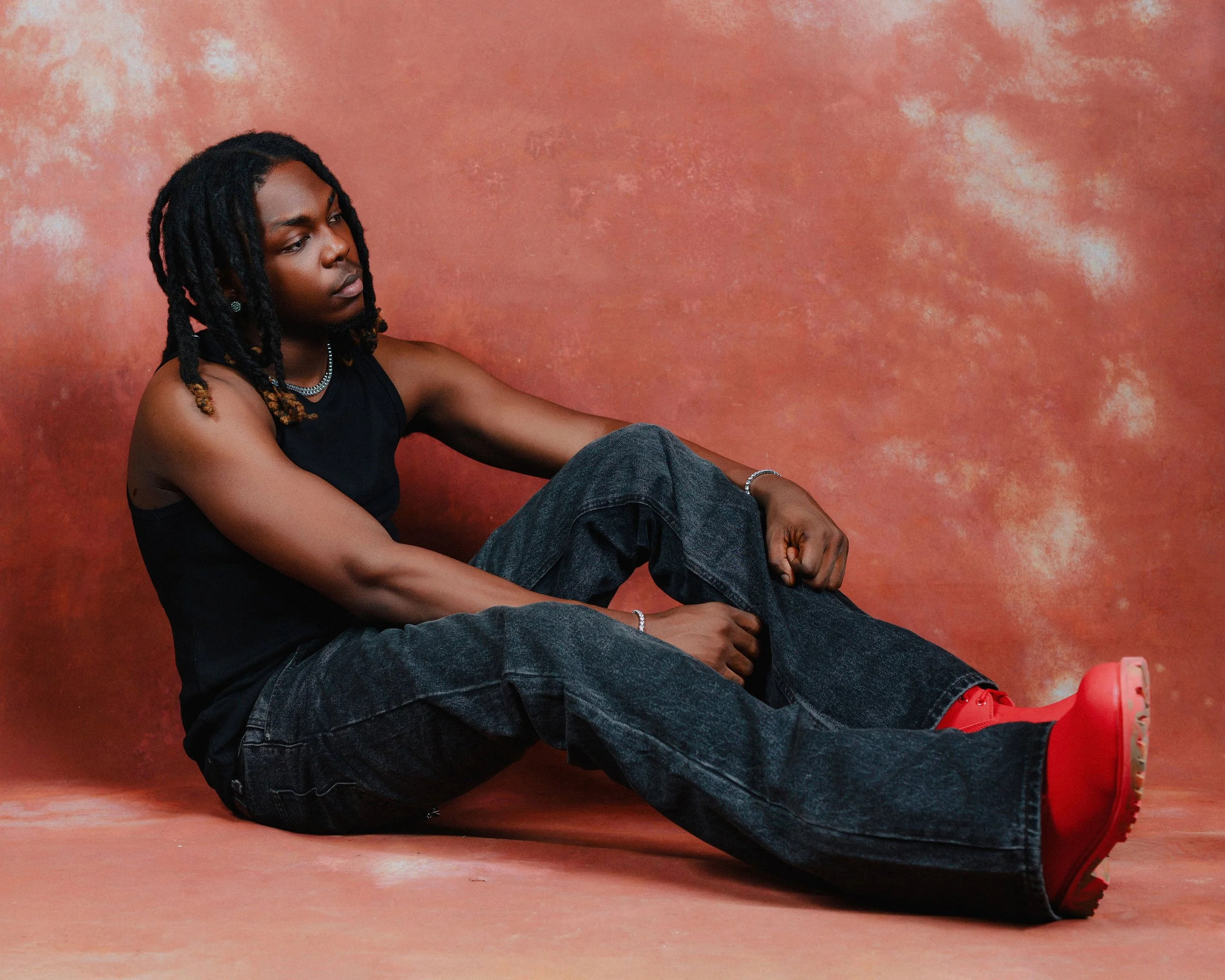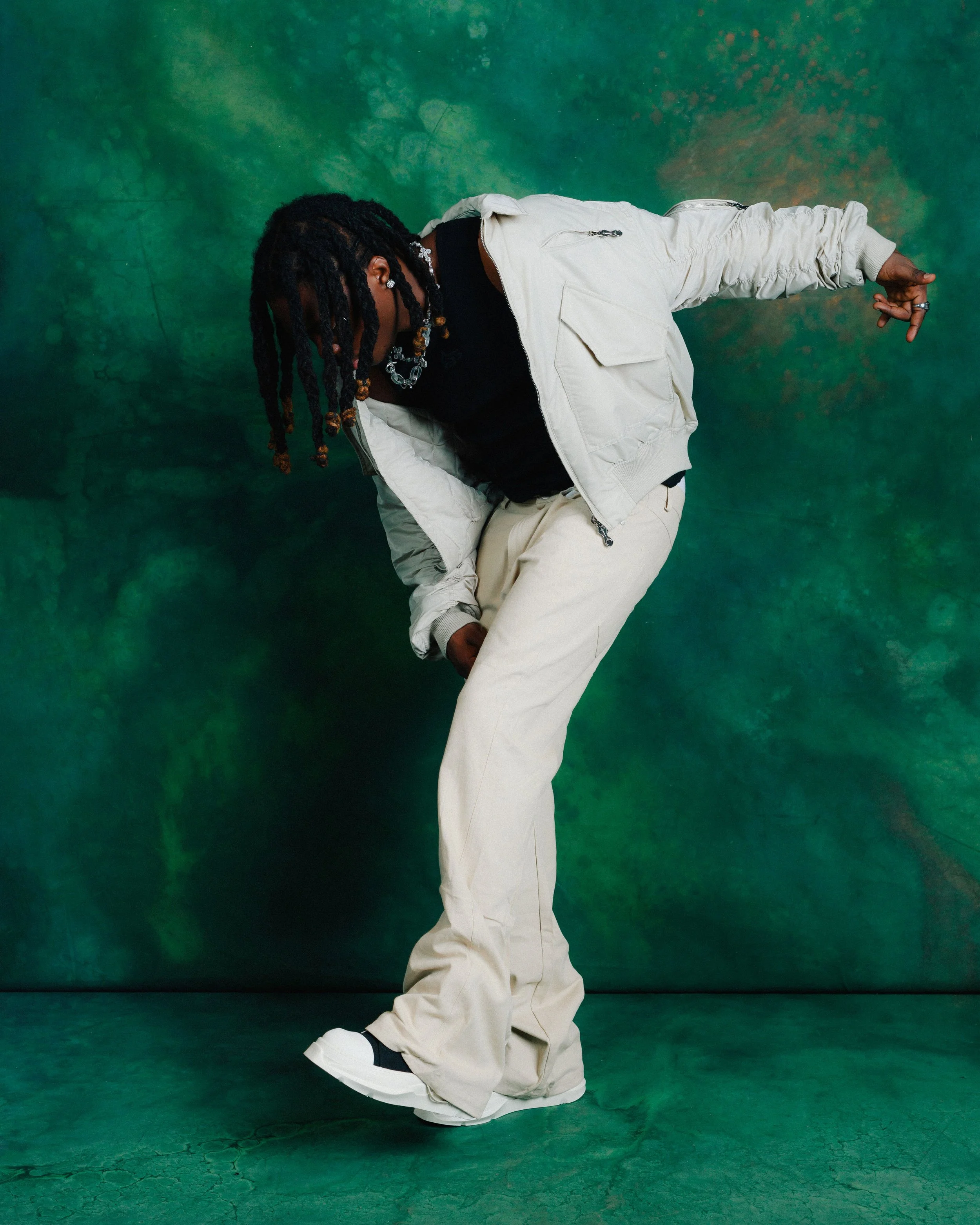Bayanni: Love, Hustle, and the Anatomy of Purpose
Words By Ada (Dir.Ley) Diop for THHGURU x Mavin Records
At THHGURU, we had the chance to sit down with Bayanni—artist, dreamer, and sonic prophet—for a conversation that left us laughing, reflecting, and at times, quietly moved. Known to the world for his breakout hit “Ta Ta Ta” and his genre-blending journey with Mavin Records, Bayanni opened up to us about everything from prayer rituals to factory jobs, trading during shows, and what “hustle” really means.
In this exclusive interview, Bayanni doesn’t just talk about music—he talks about becoming. Below is a collage of that conversation: part memory, part manifesto, and wholly a reflection of a rising star who is learning to breathe before he dreams.
Photo: Yusuf ‘BuchwithLenses’ Sanni
Breathing Before Dreaming
A Conversation with Bayanni
“They say money can’t buy happiness, so wait til I get it. The best things in life are not for free, so you better no let them deceive you,” says Bayanni on “Hustler’s Anthem.” In the trenches, you’re not thinking about happiness. You’re thinking about breathing, about freedom. That first million isn’t about greed—it’s about space. The chance to choose peace.
Born Abimbola Aladokun, later christened by friends as Zhenoboy, and now known to the world as Bayanni — a force shaped in prayer-filled rooms, carved by instruments, and fueled by a hunger that was never just about fame, but about survival, space, and sound.
From freestyles strapped to a speaker, to sonic prayers disguised as pop songs, to Jason Derulo remixes and factory shifts before fame—his music is a map of grind and grace. Of love, faith, and what it means to be called into your purpose before you even know how to name it. Bayanni, like so many dreamers, began with nothing but faith and a camera.
From Freestyles to Foresight
Nobody talks enough about the vulnerability it takes to first share your art online—the quiet hope that someone will see right through the pixels of your soul.
Ley: Do you ever look back at that Jowo cover with the speaker on your chest and think, “Wow, I really did that”?
Bayanni: “Yeah, I do. It’s wild. I came to Lagos after uni with no plan. Just my producer friend, Dopestiks. I didn’t want to tell anyone else. It was going to be about music, and I knew people were going to talk. So I kept it quiet and just worked.”
Ley: Did you always know this was your calling?
Bayanni: “I think so. I’ve always been drawn to music. Nobody taught me instruments—I just figured them out. Anything that involved music, I was already good at it.”
Prophecy in a Prayer Room
There’s a softness in his voice when he speaks of his parents.
His father paid for his first-ever studio session. His mother held something even heavier: a prophecy.
Bayanni: “A prophet once told my mom that her son would one day tell her music is his destiny. And when that happens, she must not stop him.”
And sure enough, in a small and ordinary moment, it happened—exactly like it was written. Whole time the prophecy had a breath of its own, dormant, awaiting the right place at the right time.
Bayanni released the sensation that is ‘Ta Ta Ta’ and ever so naturally featured one of his childhood idols, Jason Derulo.
Ley: You couldn’t have chosen anyone better for the remix.
Bayanni: “Thank you for saying that. Everyone in that decision room agreed—and he had already heard the song by the time we reached out.”
Organic moments, still pointing to the prophecy.
Bayanni: “When I heard Jason singing my name in the song I knew this was it. Felt unreal.”
Before all of that, though, there was the moment of impulse—the kind artists can’t explain but always recognize.
Bayanni: “I walk into the studio with an empty mind. I wait to see what the music wants to say.”
The Alchemy of Mavin: Shaping a Star
When Bayanni speaks about the Mavin Academy, he speaks of metamorphosis, a time where he had to forcibly alter his brain chemistry, to create—especially when he felt uninspired, forcing him to seek inspiration in daily moments.
Bayanni: “Recording back-to-back was normal. Even Lagos traffic noise could spark something. Even white noise.I’ve learned to create even when I’m blocked.”
Inspiration wasn’t always loud, but it was always there, hidden inside a honking car, a passing conversation, a sound behind the silence.
And through it all, Don Jazzy stood like an anchor, a mentor and friend.
Bayanni: “He sat me down and explained what a hook was,” Bayanni laughs. “I used to write three-minute songs with no hook. Just vibes.”
Jazzy taught him how to let the song breathe, to give it structure and to tame his creativity in a way that would be beneficial: both boundless and makeshift dreams turned into reality. Seems to us like Mavin is a realization machine, a family turned industry forcing you to ground your instincts in reality while staying grounded in your intuition…
Love & Hustle: A Manifesto in Music
All the collaborations you hear on the Love & Hustle EP were written before anyone was featured. Before the lights. Before the gloss.
When he and Don Jazzy crafted Hustler’s Anthem, it wasn’t just a collab. It was a sermon for every dreamer out there grinding toward their version of freedom.
Ley: What message were you trying to send with that track?
Bayanni: “People love to say, ‘money doesn’t buy happiness.’ But it’s easy to say that when you have it. Let someone gift you a million dollars and see if you’re not smiling. That’s what I mean in the line—‘wait til I get it.’”
Bayanni isn’t chasing money for money’s sake. He’s chasing space. The peace that comes with the ability to choose for yourself.
Photo: Yusuf ‘BuchwithLenses’ Sanni
He’s the kind of person who wants to be at ease with who he is, down to who he is around and the clothes he wears:
Bayanni: “If you see me wearing an outfit, no matter what it is—just know I’m comfortable in it. Don’t worry.”
And as simple and down-to-earth as he is, it seeps through all parts of his life—even recording rituals.
On Prayer, Warm Water, and Studio Rituals
Photo: Yusuf ‘BuchwithLenses’ Sanni
When it comes to the studio, Bayanni’s rituals are simple:
Bayanni: “I just pray. I drink warm water. That’s all.”
No elaborate setups. No superstition. Just grounding himself before he creates something that could crack open hearts.
And he knows when something’s special. Family taught him that.
When Bayanni finally wrapped the first version of his debut EP, it was clear to him there was a missing piece. Oftentimes we wonder how an artist, a painter, a musician, knows a piece is ready. Well—for Bayanni, it all comes down to intuition.
So he called his most loyal producer. Warm water and prayer in hand, they entered the studio again—and what was born was Family.
A song so resonant that cleaners, guards, and passersby couldn’t help but hover at the studio door.
Bayanni: “They didn’t want to intrude, but they hovered. I opened the door and just let everyone in. That’s how I knew—it connected.”
Friends, Trading, and Surviving Growth
When life in the academy got too heavy, Bayanni leaned on something unexpected: Friends—not just actual friends, but Friends the TV show.
Bayanni: “I’ve watched all ten seasons more than five times. Chandler was my favorite. His passing really hit me. But honestly, I felt connected to all of them.”
A reminder that even in chaos, joy can live.
Bayanni also found another rush outside of music: trading.
Bayanni: “Sometimes I’m on stage and mid-performance I’m thinking—‘Am I in profit or loss?’” he laughs.
He also dabbles in visual arts:
Bayanni: “I used to draw but I haven’t in like six years. I’m an extra-curriculars type of guy.”
The Eternal Hustle: What He’d Tell His Younger Self
If he could go back and talk to his younger self, he’d say:
Bayanni: “Ignore the distractions. Ignore the side talk. Stick to the music.”
Back in uni, there were endless whispers: Why waste time?
Sometimes, he admits, he listened. It slowed him down.
But not for long. Purpose has a way of finding you, even through detours. In the hallways of Obafemi University, somehow filled with an energy that birthed so many artists, Bayanni learned to swim against the current, face his fears and emerge as the version of himself he needed to be.
The Future is Rooted in Now
He’s not revealing too much about what’s next. But he’s hinted at surprises—collaborations, genre shifts, and timeless music.
Bayanni: “In five years, I want to be remembered among the greats. Not just for charting—but for keeping Afrobeat alive and making it mean something.”
Bayanni: “I don’t just want hits. I want to make music that lives longer than me.”
Final Notes: Love, Hustle, and the Human Story
And to that I say, les humains sont des éternels insatisfaits—humans are eternally unsatisfied.
At every level, there will always be a new “thing” that feels like the missing piece.
But here’s the secret Bayanni embodies: you don’t need anything more than what you have today.
You need gratitude—for the chaos, the silence, the near-misses, the prophecy-filled nights.
Bayanni’s journey isn’t just music. It’s the memory of listening to those who said he was not meant for this, then realizing he should have started much earlier despite the noise. It is a story of what I call a Rhapsodie—a synonym of a creative mind existing in a myriad of creative mediums.
From factory jobs to freestyles, to sketches and episodes of Friends, from prayer rooms, church choir to platinum dreams—Bayanni reminds us all:
Stay tuned to the melody of your own heart.
Imagine if your childhood idols stood in a room with you.
Imagine five years from now, you’re exactly where you were destined to be.
Shut down the noise.
And keep pushing.
Spread love.
And don’t let anyone discredit your hustle.
(Author’s Note):
Send me all your love & hustle stories—I’d love to hear them. Surely, we’ve all experienced both.






